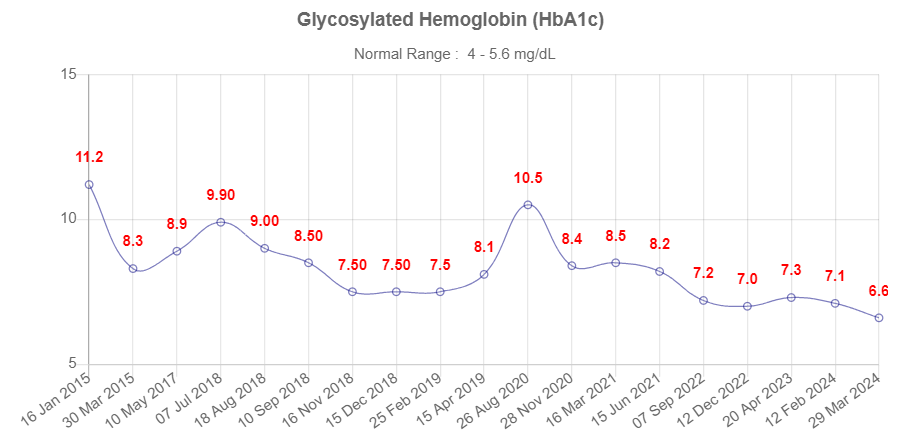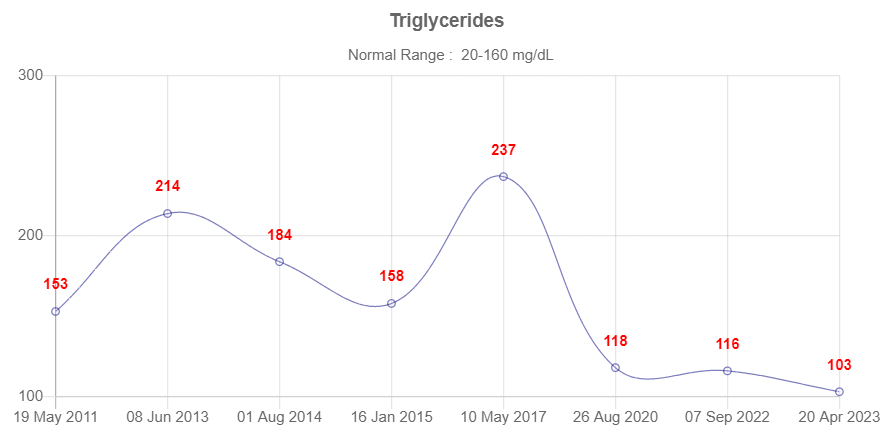Learn about each lab test marker and what it signifies for your health. Gain insights into what normal ranges are and how each marker impacts your overall well-being.
Identify and understand markers that fall outside the normal range. Discover what these deviations might indicate and how they could affect your health.
Consult with your doctor to interpret the effects of out-of-range markers. Receive professional guidance on what steps to take and how to address any potential health issues.
Use the Health Records Bank to keep a detailed record of all your lab reports. Regularly monitor any out-of-range values and track changes over time to gauge your health improvements.
Stay informed about your health by reviewing your lab reports regularly. This proactive approach helps you and your healthcare provider make informed decisions and adjust your care plan as needed.
By leveraging these strategies, you can achieve a deeper understanding of your health markers, effectively manage your health over time, and work closely with your healthcare provider to optimize your well-being.
Securely upload all your lab test reports to your Health Records Bank. Ensure that each report is complete and clearly legible.
Get a detailed analysis of your historical marker values. Understand trends, identify out-of-range markers, and gain insights into your health history.
Share the analysis with your healthcare provider. Discuss the implications of your marker values, track changes over time, and create a plan to address any health concerns. Monitor your progress and adjust your health strategies as needed to improve your overall well-being. By following these steps, you can effectively track your health, get valuable insights, and work with your doctor to enhance your health outcomes.


-
 Daily Readings
Log and track daily health readings like blood sugar levels, heart rate, and physical activity. View trends and receive insights into your daily health metrics.
Daily Readings
Log and track daily health readings like blood sugar levels, heart rate, and physical activity. View trends and receive insights into your daily health metrics. -
 Lab Reports
Upload and review lab test results. Analyze historical data, track changes in health markers, and understand the implications of lab findings. Compare results over time.
Lab Reports
Upload and review lab test results. Analyze historical data, track changes in health markers, and understand the implications of lab findings. Compare results over time. -
 Sleep
Track and analyze your sleep patterns. Monitor duration, quality, and sleep disruptions. Access tips for improving sleep hygiene and managing sleep disorders.
Sleep
Track and analyze your sleep patterns. Monitor duration, quality, and sleep disruptions. Access tips for improving sleep hygiene and managing sleep disorders. -
 Water
Record your daily water intake to ensure proper hydration. Set goals, receive reminders to drink water, and view hydration trends over time.
Water
Record your daily water intake to ensure proper hydration. Set goals, receive reminders to drink water, and view hydration trends over time. -
 Beverages
Log your consumption of beverages such as coffee, tea, alcohol, and soft drinks. Understand their impact on health and manage intake levels.
Beverages
Log your consumption of beverages such as coffee, tea, alcohol, and soft drinks. Understand their impact on health and manage intake levels. -
 Exercise / Workout
Track your physical activities and workouts. Log exercise types, duration, and intensity. Set fitness goals, monitor progress, and get workout recommendations.
Exercise / Workout
Track your physical activities and workouts. Log exercise types, duration, and intensity. Set fitness goals, monitor progress, and get workout recommendations. -
 Food
Record daily meals and snacks. Track nutritional values, manage dietary preferences, and get suggestions for balanced eating. Analyze dietary habits and their impact on health.
Food
Record daily meals and snacks. Track nutritional values, manage dietary preferences, and get suggestions for balanced eating. Analyze dietary habits and their impact on health. -
 Medicine / Suppliments
Document your medications and supplements. Schedule doses, set reminders, and track adherence. Monitor potential interactions and manage prescription refills.
Medicine / Suppliments
Document your medications and supplements. Schedule doses, set reminders, and track adherence. Monitor potential interactions and manage prescription refills. -
 Measurement
Log key health measurements such as blood pressure, glucose levels, weight, and heart rate. Track changes over time and receive alerts for abnormal values.
Measurement
Log key health measurements such as blood pressure, glucose levels, weight, and heart rate. Track changes over time and receive alerts for abnormal values. -
 Doctor Visit
Schedule and record details of doctor visits. Track appointments, discuss recommendations, and manage follow-up actions. Store notes and treatment plans from consultations.
Doctor Visit
Schedule and record details of doctor visits. Track appointments, discuss recommendations, and manage follow-up actions. Store notes and treatment plans from consultations. -
 Hospitalization
Document hospital admissions, treatments, and recovery progress. Manage discharge instructions, track follow-up care, and view a history of hospital stays.
Hospitalization
Document hospital admissions, treatments, and recovery progress. Manage discharge instructions, track follow-up care, and view a history of hospital stays. -
 Notes
Maintain personal health notes. Record symptoms, observations, and questions for healthcare providers. Organize notes for easy reference and review.
Notes
Maintain personal health notes. Record symptoms, observations, and questions for healthcare providers. Organize notes for easy reference and review. -
 Documents
Store and manage important health documents such as medical records, insurance information, and consent forms. Access and share documents securely.
Documents
Store and manage important health documents such as medical records, insurance information, and consent forms. Access and share documents securely. -
 Reminders
Set and manage reminders for medication, appointments, health checks, and other health-related tasks. Receive notifications to stay organized and on schedule.
Reminders
Set and manage reminders for medication, appointments, health checks, and other health-related tasks. Receive notifications to stay organized and on schedule. -
 Health Services
Access a directory of health services including telemedicine, wellness programs, and specialist referrals. Connect with healthcare providers and resources as needed.
Health Services
Access a directory of health services including telemedicine, wellness programs, and specialist referrals. Connect with healthcare providers and resources as needed. -
 BMI
Calculate and track your BMI. Understand how it relates to your overall health and receive recommendations for maintaining or achieving a healthy BMI.
BMI
Calculate and track your BMI. Understand how it relates to your overall health and receive recommendations for maintaining or achieving a healthy BMI. -
 Vaccination/Immunization
Record and review your vaccination history. Track upcoming vaccinations, manage immunization schedules, and stay informed about vaccine recommendations.
Vaccination/Immunization
Record and review your vaccination history. Track upcoming vaccinations, manage immunization schedules, and stay informed about vaccine recommendations. -
 Prescriptions
Upload prescriptions and detail information about prescribed medicines
Prescriptions
Upload prescriptions and detail information about prescribed medicines
What do I get from Health Records Bank? +
- Extensive Marker Access: You get access to over 500 markers for various tests, including blood, urine, and saliva, with new markers being added regularly.
- Detailed Explanations: For each marker, you receive detailed, science-based information about what your test values mean, helping you understand your health better.
- Standard Range Values: The service provides standard range values for each marker, so you can compare your results to established norms.
- Personalized Health Insights: It helps you use your health data to make informed decisions about lifestyle, diet, and supplements, aimed at improving and maintaining your health.
- Centralized Health Records: All your health-related information and records are stored in one place, making it easier to access, analyze, and monitor them at any time.
- Lifetime Storage: You can store your health records for a lifetime and share them with your healthcare providers as needed.
What is the meaning of “markers”? +
- Definition: Markers are measurable substances or characteristics in the body, such as levels of specific chemicals, proteins, or other biological components, that can indicate the presence or absence of a particular health condition or disease.
- Examples: Common markers include:
- Fasting Sugar: Measures blood glucose levels after fasting, indicating potential issues like diabetes.
- Thyroid Hormones: Assess thyroid function, which can affect metabolism and overall health.
- Cholesterol Levels: Evaluate the risk of cardiovascular diseases.
- Vitamin D Levels: Reflect your body’s vitamin D status, which is crucial for bone health and immune function. - Purpose: By analyzing these markers, healthcare providers can diagnose conditions, monitor disease progression, evaluate the effectiveness of treatments, and recommend lifestyle or dietary changes.
Can I share my reports with my doctors? +
- Generate Secured Link: The platform provides you with a secure link or access method to share your reports. This link is usually protected by encryption and may require authentication to ensure that only authorized individuals can access the information.
- Share with Your Doctor: You can send this secured link to your doctor, who can then review your reports and health records online. This facilitates easier communication and allows your healthcare provider to stay informed about your health history.
- Privacy and Security: The platform ensures that your data is kept private and secure during transmission. This might include features like password protection, expiration dates for the links, and audit trails to track who accessed the information.
Is my Health Data Safe & Secured? +
- Data Encryption: Secure data encryption is used to protect your information both in transit and at rest, making it difficult for unauthorized parties to access or decipher your data.
- Privacy Protection: Multiple layers of privacy protection are employed internally to safeguard your personal information. This includes:
- Limiting Access: Access to your personal identifiable information (PII), such as your name, age, health conditions, and test results, is restricted to ensure that only authorized individuals can view it.
- No Sensitive Identifiers: The platform does not collect sensitive identifiers like PAN, Aadhar, social security numbers, or home addresses, reducing the risk of identity theft. - Secure Payment Processing: Payment information is handled by reputable, secure payment processors and is not stored by the platform itself, minimizing the risk of payment fraud.
- No Data Selling or Third-Party Sharing: Your health records are not sold or shared with third parties. The platform maintains a strict policy against data sharing and third-party partnerships that involve your health data.



